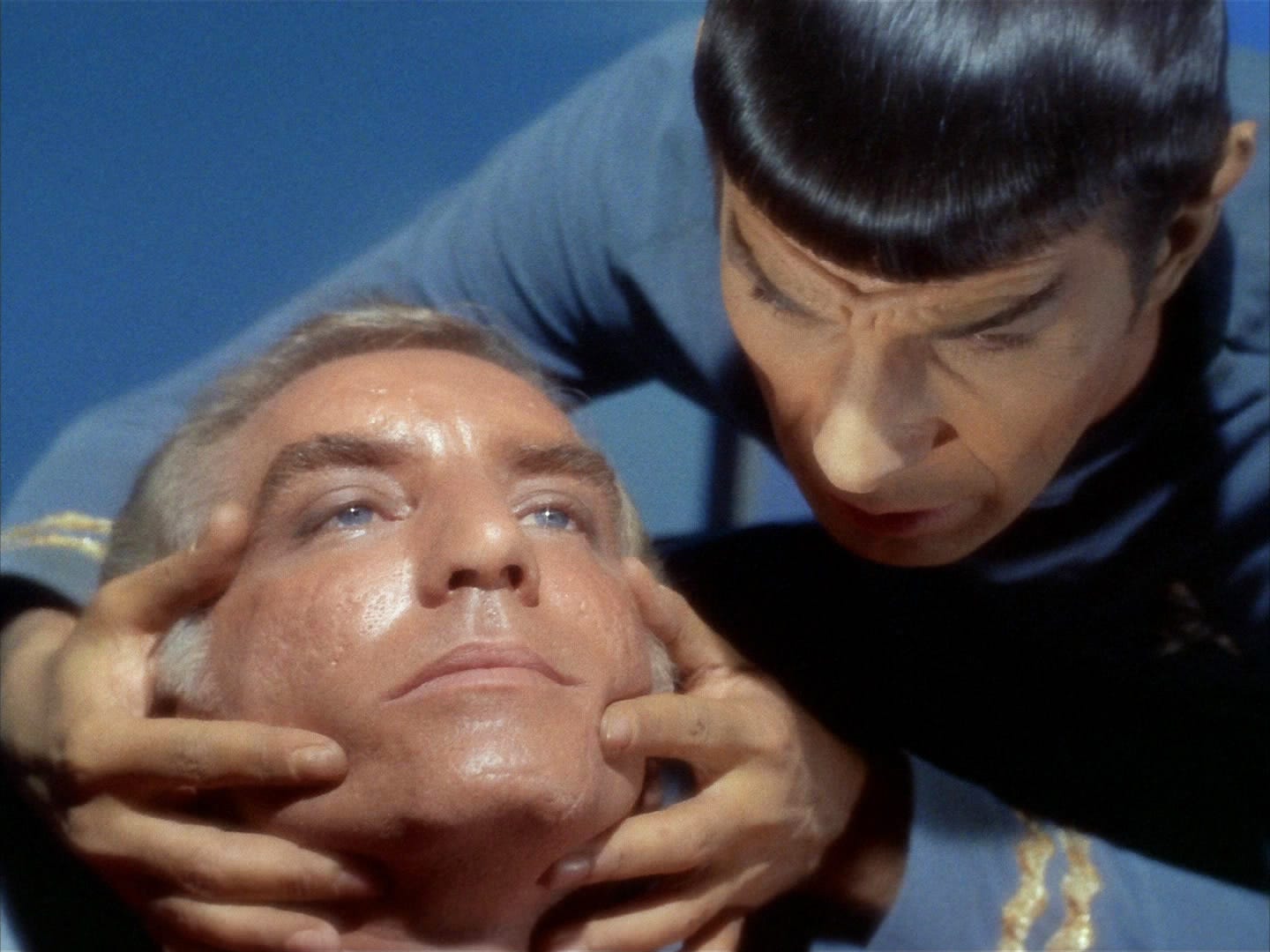Mind Melds, Rape, And Starfleet Regulations
Can we all agree that meld scene from "The Undiscovered Country" hasn't aged well?
Since it was first introduced in the first-season episode of original Star Trek, “Dagger of the Mind,” the Vulcan mind meld would go on to become a common aspect of the Star Trek universe, as well as an oft-used plot device in the franchise, as well.
As defined by Wikipedia:
A mind meld is a technique for sharing thoughts, experiences, memories, and knowledge with another individual, essentially a limited form of telepathy. It usually requires physical contact with a subject, though instances of mind melds without contact have been seen.
But as Wikipedia also notes:
However, subsequent episodes show contact between minds occurring almost immediately. Although most often seen done with humanoids, mind melds can be performed with members of other species. Spock even once successfully mind melded with a machine and was able to establish telepathic contact with the mechanical probe V'ger.

Mind melds have not been limited only to Spock. We see Security Officer Tuvok (Tim Russ) perform them in Star Trek: Voyager, as well as Vulcan priestesses in the original series and Star Trek: The Motion Picture, and elsewhere as well.
Indeed, the use of mind melds on T'Pol (Jolene Blalock) and the exploration of the history of mind melds during Star Trek: Enterprise was a very neat bit of world-building.
In fact, they were a great way to flesh out the idea of the Vulcan mind meld, which otherwise had become an almost-rote trope or certainly well-worn device through the franchise.
I'd argue that through the years, Star Trek's writers and producers had really put on auto-pilot this — forgive me — fascinating bit of alien culture and ability.
The truth is that Spock, Tuvok or whatever other Vulcan in question would, when they felt it necessary, initiate a meld — no questions asked about the larger moral or ethical implications.
It's surprising that, while Starfleet has a regulation to cover nearly everything else — including when you're allowed to have sex with aliens — not one Star Trek writer has ever explored the dramatic implications of potential regulations governing the use of mind melds.
That ease and freedom with the Vulcan mind meld created what, in retrospect, have been some very problematic scenes that hardly reflect the ideals which Star Trek tries to uphold and convey.
No more so than the scene in Star Trek VI: The Undiscovered Country, in which Spock forces a meld with the traitorous Valeris (Kim Cattrall) in order to get information to save the peace negotiations with the Klingon Empire.
Why is the forced meld on T'Pol in the Star Trek: Enterprise episode, “Fusion” considered assault — even a form of rape — but Spock's forced meld with Valeris considered acceptable in some way? Do the ends really justify the means?
A user on Reddit recently reminded just how and why the scene is so troubling — and how Cattrall's performance reflects that in what we see:
In The Undiscovered Country, Spock (perhaps under Kirks order [he looks at Spock and says his name, implying what he wants him to do]) forces a mind meld on Valeris to find out about the locations and members of the conspiracy.
Is there any in universe restrictions on using mind melds as an interrogation technique? I would think, that even in a murder investigation, Valeris would maintain some rights of due process under starfleet code. Spock physically and psychicly violates her person (and I love Kim Cattrall's performance in this scene). Does anyone else have thoughts on this?
Obviously, the scene as portrayed perhaps is correct simply from a perspective of dramatic pacing, but wouldn't Valeris be due some Starfleet rights?
And, granted — as the Redditor rightly points out — Spock would have felt a flash of anger at his trusted mentor betraying him so, but this is also the Spock who treasures values like IDIC and allowed his own brother to prance aboard the Enterprise and take it over without almost a fight in the previous movie.
In an out-of-universe sense, however, we've grown up so much in the 30-plus years since The Undiscovered Country.
Not only #MeToo, of course. But Abu Ghraib and all of the other examples of torture and denial of due process for detainees and prisoners of war.
Maybe we should be proud that, at least in this one way, our real-life universe has exceeded that of Star Trek.
And now it's time for Star Trek to catch up.
Hailing frequencies open….
Here's the latest that we've been keeping up with…
MOMENT FOR TREK
Star Trek: 10 Starfleet Rules You Never Knew Existed
Did you enjoy this edition of Subspace Chatter?
Please make sure you …
And also …



